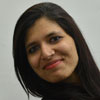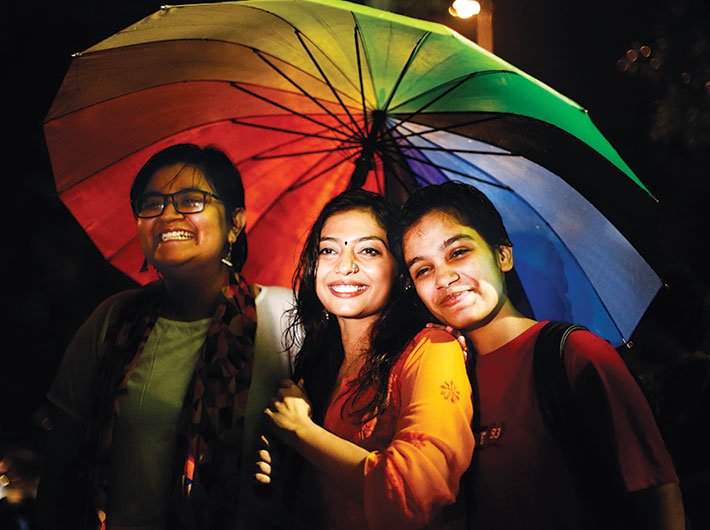After the supreme court’s historic ruling, Governance Now speaks to some LGBTQs about their lives, their dreams
The supreme court has decriminalised homosexuality by declaring that Section 377 of the Indian Penal Code will no longer apply. This has meant a lot to the community of lesbians, gays, bisexuals, transgenders, and queers (LGBTQs). With the law against them and unaccepting of them, they faced horrifying discrimination and jeering for being what they are. Times have changed and their intense lobbying over the years – not to mention their colourful pride parades – has won them a degree of acceptance, at least in the metros and the bigger cities. It will take a lot more, though, for attitudes to change in the smaller towns and in rural India. After the supreme court ruling, Deexa Khanduri spoke to some LGBTQs about their lives, their dreams.
“My father says he couldn’t have fathered a gay”
Gaurab Ghosh, 34, PhD scholar at JNU, Students Federation of India (SFI) activist
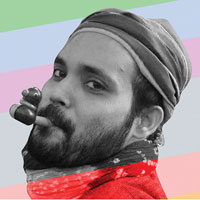 Dream: To set up a collective and hospice for LGBTQ people
Dream: To set up a collective and hospice for LGBTQ people
The year 2013 was the year of my first break-up – and also the year I announced to the world that I was gay. That year I stood for election for the post of general secretary at Jawaharlal Nehru University (JNU), declaring that I was a homosexual. I lost the election but my coming out was a victory of sorts. I was 29 then and, truth be told, I had never been aware of my sexual orientation and identity till 2007, when I was 23. Till then I’d had doubts, but somehow homosexuality was not acceptable to me. I thought I’d be dismantling family structures and society itself. For some time, I thought I was a bisexual and began a relationship with a girl. Nothing happened. In 2012, I began a relationship with a Punjabi man. It went on for a year. But for him, it was just a new experiment, nothing more, and he said he couldn’t carry it through into a full-fledged companionship. We broke up in 2013 and I went into a depression and was plagued by suicidal thoughts. It was Sappho, a Kolkata-based organisation for LGBTQ rights, and my friends at JNU who saw me through the crisis.
My friends encouraged me to stand for elections the same year. When I decided I would declare I was gay during the campaign, there were some who said it was not necessary. Some others said I was trying to seek sympathy votes. But for me, it was an occasion to declare and assert my identity and let people take me for what I am. Some Bengali newspapers covering the JNU elections wrote about me and my family came to know I was gay. My mother, who perhaps had an inkling of my orientation, was more accepting. My father and sister, though, could not face it.
On March 6, 2015, I spoke about my orientation to my father. He works for the West Bengal health department but is also a stage actor, like me. So I had thought his artistic sensibilities would help him understand me. But what he said was that my mother must have given birth to someone else’s child because he could never have fathered a gay. I have never spoken to him since. My sister is homophobic. In an interview to a newspaper, she said, “We’ve lost him and we have to accept him. But how can two men get married?” But my mother says, “I’m a woman and I can’t ruin the life of a girl by forcing my son to marry. Moreover, as a mother I cannot let my child suffer by putting him through a marriage. About same-sex marriages, I really don’t know much...they are perhaps a little more than just friendship.”
At the JNU campus, I was later thrown out of the hostel. Some laughed at me. I was threatened by goons of the Akhil Bharatiya Vidyarthi Parishad (ABVP). I faced it all. I started teaching as an ad hoc lecturer at Ambedkar College in Delhi. The principal did raise the question of my sexual orientation. I always maintained that my sexual orientation would never affect my work.
My coming out during the JNU elections strengthened my resolve. I began to organise LGBTQ walks, protests, and film festivals. In 2014, we organised a ‘Kiss of Love’ peace walk from the Jhandewalan metro station to the RSS office. When some RSS goons tried to beat me up, Delhi police saved me and ensured that I reached the JNU campus safe. I must say that, knowing I am gay, Delhi police has never harassed me. They’ve always helped me. But the BJP and the Sangh parivar have declared me a Maoist and an anti-national. The Bengal unit of the BJP circulated a video of my ‘Kiss of Love’ to misuse it for elections.
Last year, I had this strange experience at the New Delhi railway station. A man just walked up to me and asked me if I could give him the “whole porn clipping”. I later realised that, probably recognising me from the ‘Kiss of Love’ video which had gone viral, he assumed there was more than just the kiss and that I would have the whole clip with a lot more action. Even faced with such situations, I have to be polite so that people don’t start hating or having misconceptions about the LGBTQ community.
After SC verdict, what?: With the law no longer against us, it is the beginning of a struggle for LGBTQ rights, political and economic.
“I’m not seeking others’ approval, but am willing to give them time to understand me”
Akassh K Aggarwal, 29, jewellery designer
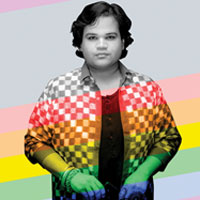 Dream: To adopt a girl child
Dream: To adopt a girl child
I realised I was gay when I was 16. Till then, I wasn’t sure but I realised I was on the feminine side of the male/female binary. I felt I have feminine energy. In childhood, I celebrated the girl inside me by idolising Sushmita Sen. Even today, I idolise her. It took me time to realise and accept my sexual orientation.
What made it difficult was that I come from a ‘Delhi-6’ family, a conservative baniya family of Chandni Chowk. I didn’t want to shock them, nor did I want to shut myself up in my room for two days and then suddenly open the door and tell them about my sexual identity. But all along, I’ve been transparent. I’m proud to be gay. I opened up about my sexuality in 2017 in a YouTube video, and since then, some sections of my extended family have ignored me completely.
I lost my father when I was 21. He was afraid that I was impotent or a kinnar (transgender) and even suggested I visit a doctor to cure myself. But he never imposed his wishes on me. My mother knows I am gay. It took my sister five years to accept the idea that I was gay. But frankly, ending relations with my family was never an option for me or for them. I’m a family person and I need them.
It was not just about my family. It’s a challenge to make society understand me. When I go to a saloon, walk by, go shopping, etc., I see people sometimes smirk at me.
The key to fighting all battles is self-acceptance and this is true of the battles LGBTs have to wage as well. I look at it this way: I am just expressing my sexuality, I’m not seeking others’ approval or acceptance. But yes, I’m willing to give them time to try to understand me.
So far I’ve never been in a relationship. There are men I liked and was attracted to, but it didn’t evolve into a relationship. I seek a compassionate partner who will be the love of my life. But it doesn’t mean I will make a fool of myself to achieve that. Sometimes, I feel very lonely and break down when I think there is no one walking with me.
I am happy to see that so many voices came out in our support during the battle against Sec 377 IPC. We need achievers and inspiring personalities who are LGBTQs to speak on the subject so that the masses can connect to us with sensitivity. Bollywood has done great harm through its portrayals of LGBTQs. Commercial Bollywood may accept you, but will never embrace you or celebrate you. In a three-hour movie, they’ll have a 30-second clip that either demeans or makes fun of LGBTQs with a remark such as “ma ka ladla bigad gaya”!
After SC verdict, what?: I look forward to equality in society, to work towards a cohesive LGBTQ community that works with responsibility.
“Relationship is not as strong a word as marriage. So we must legalise homosexual marriages”
Pooja Srivastava, 42, self-employed former journalist, Delhi NCR
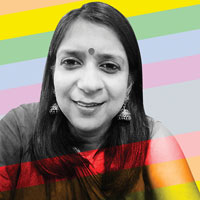 Dream: To get homosexual marriages legalised in India
Dream: To get homosexual marriages legalised in India
For every LGBTQ, it’s a tough journey of realisation. First, we live in denial. Then, we explore and experiment with our self and our sexuality. Finally we accept and understand ourself and our sexuality. After that comes the more difficult part: telling our families who we are and getting acceptance from them. My family probably learnt about my orientation when I was 15-16, maybe even before that. But more than 25 years on, they are unable to accept the truth. Given a choice, they would have me undergo therapy or whatever to make me change into what they think I should be.
I was born and brought up in Varanasi. When I was in Class VII, I had a huge crush on my neighbour who was five years my senior. I used to wait for her on my terrace and want to look at her. My family members said it was an unnatural feeling. But a feeling that was happening naturally to me...how could they call it unnatural? I didn’t choose between loving a man or a woman. The choice came naturally to me.
When my mother learnt about my inclination, she blasted me. She asserted that girls can only get attracted to boys. She said I was not to meet or talk to my neighbour. But my attraction drew me to my neighbour and we continued to meet on the sly. Later, she got married to someone else.
After school, I came to Delhi to live with my sister and continue my studies. My sister objected to my sexual orientation and I had to leave her house. My family stopped supporting me financially and my studies were disrupted. In order to improve relations with my family, I had to lie to them that I was in a relationship with a man. But somewhere deep down, they knew the truth about my sexual orientation.
My confusion and depression continued. I consulted a psychiatrist who told me my feelings were abnormal and gave me medicines that made me sad and sick. He insisted that I make myself realise that my feelings and emotions were wrong. It was the worst time of my life. There was no one to hear me out. Around 2000, I came across Sangini helpline, an organisation supporting lesbians. They supported and encouraged me and told me my feelings were normal. They are the reason I am surviving today.
Meanwhile, my sisters proposed that I get married to a gentleman who was my best friend. I always thought he was a dear friend and nothing more; making him my husband would leave me feeling strangulated. I told him that I was a lesbian and I couldn’t marry him, but he responded, “Let’s get married, everything will be okay!”
I joined the media, and I had many crushes and developed a serious relationship with a TV anchor. But she later got married. Bisexuals can opt for marriage, but there’s no option for homosexuals. Heterogenous couples take many things for granted, but for us, following societal norms is a challenge.
At 42, there is nothing much for me to fight but the next generation should not have to go through what we have been through. If I don’t speak out now, then when will I do so and for whom? No teenager should be forced to quit education because of his or her sexual orientation. No one should be forced to undergo mental trauma because of his or her sexual orientation.
Our next fight is for marriage. I have a partner, and I want to marry her in future. We aren’t staying together because she has an ailing father and I have an ageing mother and we need to take care of them. I talk about my partner with my mom but still she’s not very comfortable with it. Homosexuality has been decriminalised but we haven’t talked about it. I do regret it. Even now I’m afraid that if someone comes home and starts talking to my mother about my sexual orientation, I may not be able to handle the situation.
I think it’s very important to legalise homosexual marriages, because “relationship” is not a strong enough word. It isn’t as strong as the word “marriage”.
After SC verdict, what?: I want to adopt a child with my partner and have the right like to have a joint bank account. Also property rights for the LGBTQ community.
“I had to quit jobs because people teased me. Now, I’m releasing my own music album, Devi”
Atul Kumar Singh, 30, musician, activist, Fatehpur, UP
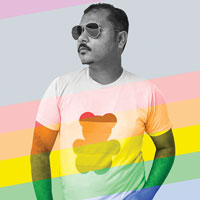 Dream: To set up a restaurant chain run entirely by LGBTQs
Dream: To set up a restaurant chain run entirely by LGBTQs
When I was five or six years old, I liked to dance, sing, stitch clothes for dolls. I had an inclination towards girlish antics. Where I come from – a small village of Uttar Pradesh – boys are meant to play cricket, kabaddi, or sports that call for strength. Since I was effeminate, my relatives made fun of me, nagged me, played pranks on me.
In school, my first crush was my principal. It was a very innocent thing and not much is to be made of it. I was a bright student and I realised that education alone would give me a respectable life for which I’d have to leave the village. I turned to religion and was fanatical in my devotion to Lord Ram, Lord Krishna, and Lord Shiva. I read in religious books that the atma is neither male nor female and this idea of my inner self being beyond the male and female identities fascinated me. I believed that just as Krishna rescued Draupadi, he would save me from my current predicament. Seeing me become so religious, my parents were terrified. My father was into politics and wanted his children to have a vigorous, assertive personality and identity. But I was geekish, introverted, and did not want to interact with others. I was sexually abused when I was ten by a cousin who was ten years elder to me. I was so traumatised by the experience that I started hating males who visited our home. This was part of the reason I did not like to interact with others.
When I was in Class X, I had a massive attraction for our maths teacher. But he got married the same year. I was depressed and attempted suicide. I later moved to Kanpur for further studies with my uncle. Since I was sweet, cute and polite, my classmates called me ‘meetha’ and bullied and harassed me. I was again attracted to a guy in the neighbourhood and he seemed to like me too. But two months after I proposed to him, he called up my father and complained about me. I had to lie to my father to manage the situation. It’s something I regret.
I joined Galgotia University in Greater Noida, but my university experience was no different than from my school days. I got involved with a bisexual guy who took advantage of me, emotionally and financially.
After college, I got a decent job in Delhi and then in Agra, but I had to leave these jobs within a few months because people made fun of my effeminate behaviour and my sexual orientation. Finally, after working at some ten jobs, I decided I would pursue a career in music and I am releasing my first album, ‘Devi’, soon.
Five years back, I told a close friend, an army man, about my sexuality. He just laughed and didn’t accept it; for him, gays just did not exist. Later, after learning about the LGBTQ community, he came to me and apologised. It felt good.
My mother doesn’t know about my orientation yet, but I think my dad has a good idea. They seem to think that if I agree to marry a woman, everything will work out fine. Two years ago, my dad asked me if I will be marrying at all. I told him that I can’t. Since then, we haven’t spoken.
After SC verdict, what?: I’m happy to know that we aren’t criminals, but we need to fight for same-sex marriages and the right to adopt a child.
“We’re no longer criminals, but still treated like brothers or sisters of criminals”
Devendra Sharma, 27, English lecturer and kathak dancer, Agra
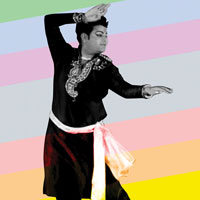 Dream: To make the education system sensitive and friendlier to LGBTQs.
Dream: To make the education system sensitive and friendlier to LGBTQs.
It is only after I received the Kala Ratna award for kathak from the then president in 2011 that society accepted me as a human being. Even my family started showing signs of acceptance only after that. The fact is, however, that my father still doesn’t know of my sexual orientation. My mother has known it for long that I am gay and she has always been accepting of my sexual orientation. My younger brother does not talk to me. My elder sister has known that I am gay and she accepts me as I am.
As a child I found it very difficult to understand what was going on inside me. When I was nine, I got attracted to a guy in my class but those feelings troubled me. I couldn’t put in words the feelings I had. It was around that time that I realised I preferred to wear lehenga-cholis, sarees and make-up.
My family once took me to a kathak performance by Pandit Uma Shankar in Jaipur, where I grew up, and I was so mesmerised that I insisted that my mother allow me to learn kathak. When I was ten, I was sexually abused by a cousin and could not complain about it to anyone.
I grew up feeling isolated. In school, boys wouldn’t want to sit with me. They would call me chhakka or kinnar. They would make lewd gestures. Otherwise they would behave as if I was an untouchable.
Thanks to my mother’s insistence, I completed my post-graduation and have been able to get a teaching job at Agra University. That and my dance have helped me stabilise my life.
After SC verdict, what?: I look forward to society changing the way it looks at us and talks about us. Even renting a room is a challenge for us. We’re no longer criminals, but we are still treated as if we are the brother or sister of a criminal.
(The story appears in the September 30, 2018 issue)
